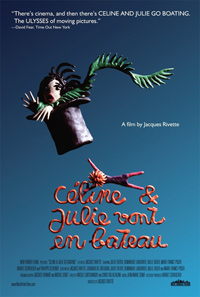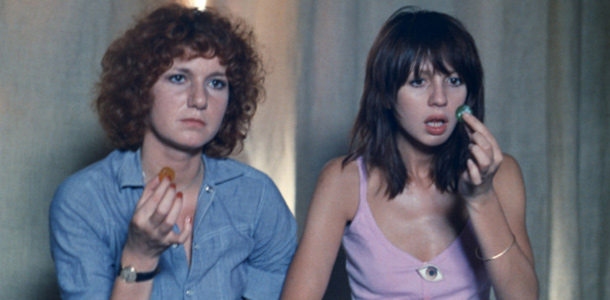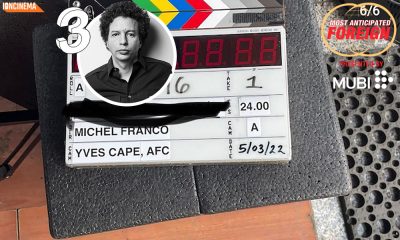Reviews
Celine and Julie Go Boating | Review
Jacques Rivette’s 1974 Phantasma Frees Cinema from its Cage
 One afternoon in a sleepy Paris park, fanciful librarian Julie traces an occult symbol in the gravel and—poof!—the beautiful and mysterious Celine appears. It’s the first of many magical happenings in Jacques Rivette’s anarchic daydream ‘Celine and Julie Go Boating’ (1974). After popping a few enchanted sucking candies, the pair are transported to an alternate reality inhabited by a decadent aristocratic family whose destiny seems perpetually bound for tragedy. Our headstrong heroines are desperate to avert an innocent girl’s murder. But can they overcome their chronic amnesia and déjà vu to discover the identity of the killer (and possibly the nature of identity itself) before it’s too late?
One afternoon in a sleepy Paris park, fanciful librarian Julie traces an occult symbol in the gravel and—poof!—the beautiful and mysterious Celine appears. It’s the first of many magical happenings in Jacques Rivette’s anarchic daydream ‘Celine and Julie Go Boating’ (1974). After popping a few enchanted sucking candies, the pair are transported to an alternate reality inhabited by a decadent aristocratic family whose destiny seems perpetually bound for tragedy. Our headstrong heroines are desperate to avert an innocent girl’s murder. But can they overcome their chronic amnesia and déjà vu to discover the identity of the killer (and possibly the nature of identity itself) before it’s too late?
Inside the aristocrats’ House of Decay a moribund melodrama plays itself out ad infinitum, like a wind-up toy with a dying battery, grinding monotonously on to the same destructive climax each time. It’s a free-floating metaphor – take your pick for which obsolete social, cultural or psychic construct to project onto it (the most obvious, perhaps, being worn-out Hollywood formulas).
This self-reflexive “meta” element in ‘Celine and Julie’ surely lends it to being a knee-jerk subject for rote college film theory papers on post-structuralism, author vs. spectator, female agency, etc. (like many French New Wave-rs, Rivette started out as a Cahiers du Cinema film critic). But the movie’s unique genius lies in its equal embrace of the analytical and the uncanny, in the ebb-and-flow exchange between the conscious and unconscious, the waking and dream life. At a sprawling three hours-plus, Rivette’s cryptic, kooky masterpiece resembles an elaborate game of hide-and-seek between the left and right brain.
Because Rivette seems to draw no boundaries between the actresses’ personalities and the characters they play, the movie is inconceivable without its two leads (the actresses co-wrote the movie as well). As Celine, Juliet Berto is a frazzled femme fatale, part temptress, part clown. Dominique Labourier (Julie) is not as iconically beautiful as Berto, but her secretive quality, her aloof aloneness, ultimately makes her the more fascinating of the two. Can both Berto and Labourier become too admiring of their own quirkiness? They can. But the fact that their act occasionally wears thin only serves the movie’s basic elusiveness.
Together, they’re a two-woman guerilla army fighting a leisurely war of resistance against society’s stabilizing pillars, from the public library’s stuffy insistence on silence, all the way to the finality of death. Rivette’s free-form filmmaking still seems exhilaratingly ahead of its (and, sadly, our) time. No less subversive for its playfulness, ‘Celine and Julie’ is an act of gleeful defiance, an outburst of freedom in the face of grim Fate.
Rivette’s revelation is that just as the true nature and appeal of art is not in anesthetizing the audience’s brain, but in sparking the imaginative impulse, so too the nature of friendship and love, and its appeal, lies in each person dreaming a new version of the other to life.






























